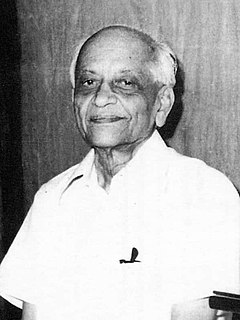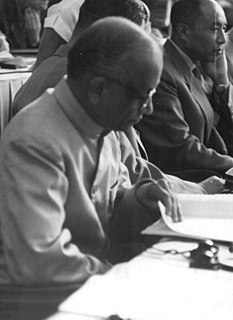Related Research Articles

The Communist Party of India (Marxist) is a communist political party in India. It is the largest communist party of India in terms of membership and electoral seats and one of the national parties of India. The party emerged from a split in the Communist Party of India (CPI) on 7 November 1964. As of 2022, CPI(M) is a part of ruling alliances in three states — the Left Democratic Front in Kerala, Mahagathbandhan in Bihar, and the Secular Progressive Alliance in Tamil Nadu. CPIM has representation in the legislative assemblies of 9 states.

The Communist Party of India (CPI) is the oldest communist party in India and one of the eight national parties in the country. The CPI was founded in Cawnpore on 26 December 1925.

Padayatt Kesavapillai Vasudevan Nair, popularly known as PKV, was the 9th Chief Minister of Kerala and a senior leader of the Communist Party of India (CPI). He was elected to the Lok Sabha four times, in 1957, 1962, 1967 and 2004, and to the Kerala Legislative Assembly twice, in 1977 and 1980. He became Chief Minister on 20 October 1978, following A. K. Antony's resignation as Chief Minister. However he resigned on 7 October 1979 owing to differences with other parties in the United Front.

Subhasini Ali is an Indian politician and a member of the Communist Party of India (Marxist). She is the President of the All India Democratic Women's Association and former Member of Parliament from Kanpur.

Mohammed Salim is an Indian politician, belonging to the Communist Party of India (Marxist). He was inducted in the politburo of CPI(M) in the 21st party congress organised at Visakhapatnam in 2015. He was a member of the 16th Lok Sabha, representing Raiganj constituency. Earlier, he was a member of the 14th Lok Sabha, representing the Calcutta North East constituency of West Bengal. After delimitation, in the 2009 Lok Sabha election Salim contested the new Calcutta North constituency, and lost to Sudip Bandyopadhyay of the Trinamool Congress.
Kotha Raghuramaiah was an Indian politician who served as a Member of Parliament and Cabinet Minister of Parliamentary Affairs.

Shripad Amrut Dange was an Indian Politician who was a founding member of the Communist Party of India (CPI) and a stalwart of Indian trade union movement. During the 20th century, Dange was arrested by the authorities for communist and trade union activities and was jailed for an overall period of 13 years.

Bommagani Dharma Bhiksham, a veteran leader of the Communist Party of India, was a member of the 10th Lok Sabha, and 11th Lok Sabha of India. Also he was elected to Assembly three times. He represented the Nalgonda constituency of Andhra Pradesh both in the Parliament of India and Legislative Assembly of Andhra Pradesh from Communist Party of India (CPI) political party. He also represented Hyderabad State Assembly from Suryapet constituency. He was the renowned freedom fighter during Telangana peasantry armed struggle at the time of Nizam regime. He was well known trade unionist and President of All India Toddy Tappers and workers Federation. Government of India honoured him by awarding the Thamra patra. His brother Venkataiah is also a freedom fighter.

Hare Krishna Konar was an Indian Marxist revolutionary, radical activist and Communist politician. Konar was a founding member of Communist Party of India (Marxist), and the leader to start the first land reforms and agrarian reforms in India as well as the chief architect of the West Bengal land and property distribution. In 1930s for making arms and bombs for the Jugantar group, he was deported to the Cellular Jail for 6 years at the age of 18 and there he took part in the first hunger strike and in 1935 he founded the Communist Consolidation and led the historical second hunger strike. Konar was the mentor of freedom fighters like Batukeshwar Dutt, Shiv Verma, Sachindra Nath Sanyal, Ganesh Ghosh, etc.

Samar Mukherjee was an Indian Communist leader. who served as member of the Lok Sabha, the lower house of the Parliament of India for the Howrah constituency for three consecutive term, and as a member of the Rajya Sabha. He was a member of the Polit Bureau, member of the Central Committee of Communist Party of India (Marxist) and he was also the General Secretary CITU.

Chandradeo Prasad Verma is a politician who was elected to the Lok Sabha's lower house of the Parliament of India from the Arrah, Bihar in 1977, 1980 and 1996. He was the Union Minister of State for Rural Areas and Employment. He was earlier Member of the Bihar Legislative Assembly and a Cabinet minister in Bihar.
Satyapriya Banerjee was an Indian politician and trade unionist.
Bhan Singh Bhaura was an Indian politician. He was a leader of the Communist Party of India in Punjab. He served as a member of the National Executive of the CPI as well as president for the Bharatiya Khet Mazdoor Union. He was also a Punjab State Executive member of CPI. He was elected to the Lok Sabha in 1971 and 1999 from the Bhatinda seat. He was elected to the Punjab Legislative Assembly twice as well.
Shibban Lal Saxena was a former Indian politician and Freedom Fighter. He was son of late Shri Chhotey Lal Saksena and his uncles'were late Shri Shyam Sunder Lal Saksena and late Shri Ram Sunder Lal Saksena. He was born on 13 July 1906 to a wealthy Kayastha Family at Agra.

Sebastian Cyril Constantine Anthony Pillai was an Indian trade unionist, politician and Member of Parliament.
Sudha Roy (1914–1987) was an Indian communist trade unionist and politician. She was a prominent leader of the Bengal Labour Party, the Bolshevik Party of India and later joined the Communist Party of India. She was one of the most prominent female leaders of the Bengali left.
Krishnapada Ghosh (1914–1987) was an Indian politician and trade unionist. He served as West Bengal Minister of Labour 1969–1970 and 1977–1985. He was a Central Committee member of the Communist Party of India (Marxist). He was also a member of the Working Committee of the Centre for Indian Trade Unions.

In 1964 a major split occurred in the Communist Party of India. The split was the culmination of decades of tensions and factional infighting. When India became independent in 1947, differences arose of how to adapt to the new situation. As relations between the Nehru government and the Soviet Union improved, a faction that sought cooperation with the dominant Indian National Congress emerged within CPI. This tendency was led by S.A. Dange, whose role in the party hierarchy became increasingly controversial. When the Sino-Indian War broke out in 1962 Dange's opponents within CPI were jailed, but when they were released they sought to challenge his leadership. In 1964 the party was finally divided into two, with the left faction forming the Communist Party of India (Marxist). The split had a lot of regional variations. It also impacted other organizations, such as trade union and peasant movements. The split has been studied extensively by scholars, who have sought to analyze the various domestic and international factors involved.
R.N. Upadhyaya was an Indian politician and trade unionist. He joined the Hindustan Socialist Republican Army in 1938. In 1940 he became a member of the Revolutionary Socialist Party. He participated in the August 1942 Quit India movement. He was jailed for his role in the independence struggle, and was released in 1946. He joined the Communist Party of India in 1952.
Sant Singh Yusuf was an Indian trade unionist and politician.
References
- ↑ Who's who in India, Burma & Ceylon. India: Who's Who Publishers (India) Limited. 1967. p. 10.
- ↑ "Members Bioprofile".
- ↑ Asian Recorder - Volume 34. K. K. Thomas at Recorder Pres. 1988. p. III.